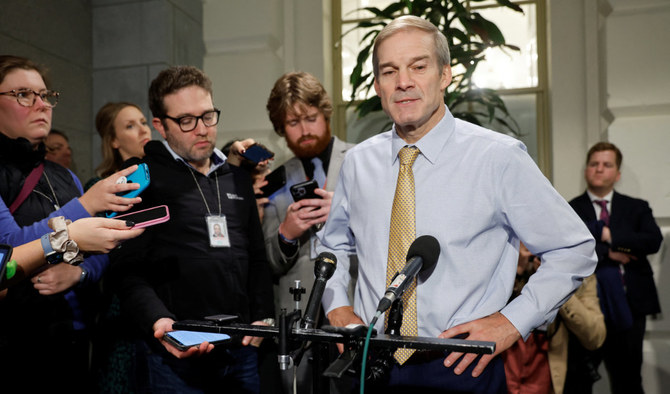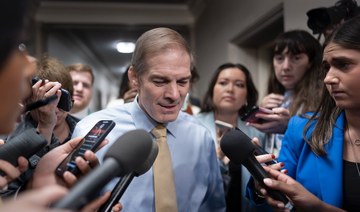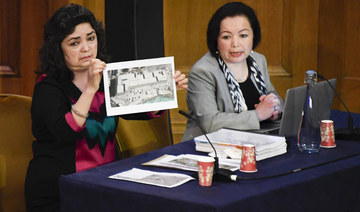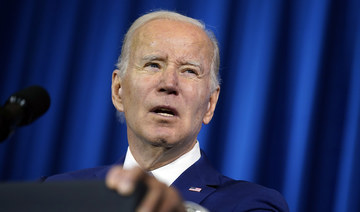WASHINGTON: Republicans abruptly dropped Rep. Jim Jordan on Friday as their nominee for House speaker, making the decision during a closed-door session after the hard-edged ally of Donald Trump failed badly on a third ballot for the gavel.
The outcome left Republicans dejected, frustrated and sinking deeper into turmoil, another week without a House speaker bordering on a full-blown crisis. House Republicans have no realistic or working plan to unite the fractured GOP majority, elect a new speaker and return to the work of Congress that has been languishing since hard-liners ousted Kevin McCarthy at the start of the month.
Afterward, Jordan said simply of his colleagues, “We put the question to them, they made a different decision.”
The hard-charging Judiciary Committee chairman said House Republicans now need to come together and “figure out who our speaker is going to be.”
Their majority control floundering, Republicans left the private session blaming one another for the divisions they have created. Next steps were highly uncertain, as a wide range of Republican lawmakers started pitching themselves for speaker.
But it appears no one at present can win a GOP majority, leaving the House without a speaker and unable to function for the foreseeable future, an embarrassing blow to a central US seat of government.
“We’re in a very bad place right now,” McCarthy said.
Majority Leader Steve Scalize said they would “start over” on Monday. New nominees are to come forward for a candidate forum and internal party votes.
Exasperated with no easy solutions in sight, Rep. Mark Alford, a freshman from Missouri, was far from alone in expressing his anger and disappointment.
“I gave up my career to come here to do something for America, to rebuild our military, to get spending under control, to secure our border — and here we are in this quicksand,” he said.
In a floor vote Friday morning, Jordan’s third reach for the gavel, he lost 25 Republican colleagues, worse than he had fared earlier in the week, and far from the majority needed.
A founder of the far-right House Freedom Caucus, Jordan’s run essentially collapsed in large part because more centrist Republicans are revolting over the nominee they view as too extreme and the hardball tactics being used to win their votes. They have been bombarded with harassing phone calls and even reported death threats.
To win over GOP colleagues, Jordan had relied on backing from Trump, the party’s front-runner in the 2024 election, and groups pressuring rank-and-file lawmakers for the vote. But they were not enough and in fact backfired on some.
Friday’s vote was 194 for Jordan, his lowest tally yet, and 210 for Jeffries, with two absences on each side.
In fact, the Jordan lost rather than gained votes despite hours spent trying to win over holdouts, no improvement from the 20 and then 22 Republicans he lost in early rounds this week.
McCarthy himself rose in the chamber to nominate Jordan, portraying him as a skilled legislator who reaches for compromise. That drew scoffs of laughter from the Democratic side of the aisle.
Democrats nominated Leader Hakeem Jeffries, with Rep. Katherine Clark calling Jordan, who refused to certify the 2020 presidential election results, “a threat to democracy.”
For more than two weeks the stalemate has shut down the US House, leaving a major part of the government severely hobbled at a time of challenges at home and abroad. While Democrats have offered to broker a bipartisan deal to re-open the House, the Republican majority appears to have no idea how to end the political turmoil and get back to work.
With Republicans in majority control of the House, 221-212, any candidate can lose only a few detractors. It appears there is no Republican at present who can win a clear majority, 217 votes, to become speaker.
One extraordinary idea, to give the interim speaker pro tempore, Rep. Patrick McHenry, more powers for the next several months to at least bring the House back into session and conduct crucial business, was swiftly rejected by Jordan’s own ultra-conservative allies and brushed back by McHenry himself.
Republicans predict the House could essentially stay closed until the mid-November deadline for Congress to approve funding or risk a federal government shutdown.
“We’re trying to figure out if there’s a way we can get back with a Republican-only solution,” said veteran legislator Rep. Tom Cole, R-Oklahoma
“That’s what normal majorities do. What this majority has done is prove it’s not a normal majority.”
What’s potentially more unsettling is that it’s not at all clear what the House Republicans are even fighting over any more — let alone if any GOP leader can fix it.
The Republican chaos that erupted Oct. 3 when a small band of eight hard-liners led by Rep. Matt Gaetz of Florida orchestrated McCarthy’s historic ouster, has cascaded into angry grievances, new factions and untested alliances.
Gaetz and the hard-liners wanted to punish McCarthy for a number of perceived wrongs, including passing legislation with Democrats to keep the government funded and prevent a federal shutdown.
But when Majority Leader Steve Scalize won the nomination to replace McCarthy, Jordan’s allies broke from party rules and blocked the Louisianan’s rise. Scalize abruptly withdrew his nomination.
Angry that Scalize didn’t seem to get fair treatment, more mainstream Republicans staged their own revolt against hard-liner Jordan, saying he didn’t deserve the gavel.
Weeks of heated, fiery meetings later, Republicans have drifted far off track from what had been their House majority’s stated priorities of cutting spending and other goals.
Democratic Leader Jeffries reiterated that his party was “ready, willing and able” to work with more traditional Republicans on a path to re-open the House — particularly as Congress is being asked to consider President Joe Biden’s aid package for Israel, Ukraine and other needs.
Jordan has been a top Trump ally, particularly during the Jan. 6 Capitol attack by the former president’s backers who were trying to overturn the 2020 election he lost to Biden. Days later, Trump awarded Jordan a Medal of Freedom.
First elected in 2006, Jordan has few bills to his name from his time in office. He also faces questions about his past.
Some years ago, Jordan denied allegations from former wrestlers during his time as an assistant wrestling coach at Ohio State University who accused him of knowing about claims they were inappropriately groped by an Ohio State doctor. Jordan has said he was never aware of any abuse.
House Republicans drop Jim Jordan as their nominee for speaker, stumbling back to square one
https://arab.news/52267
House Republicans drop Jim Jordan as their nominee for speaker, stumbling back to square one

- The combative Trump ally lost 25 Republican colleagues on his third attempt for the speakership, worse than in his earlier bid
- Chaos erupted on Oct. 3 when a small band of eight pro-Trump hard-liners orchestrated the removal of Kevin McCarthy as House Speaker
Using frozen Russian assets for Ukraine must align with law, Japan says

TOKYO: Japanese Finance Minister Shunichi Suzuki said on Friday it is important that discussions will be aligned with international law when asked about a US proposal for using the interest derived from frozen Russian assets to aid Ukraine.
“Japan plans to join the discussions at the upcoming Group of Seven meeting from this basic standpoint,” Suzuki said.
Senegalese prime minister criticizes French military bases on territory

- “I reiterate here the desire of Senegal to have its own control, which is incompatible with the lasting presence of foreign military bases in Senegal," PM Sonko said
- Neighbours Mali, Burkina Faso and Niger have pushed out French troops and turned to Russia for help fighting jihadist insurgencies on their territory
DAKAR: Senegal’s prime minister Ousmane Sonko raised the possibility of closing French military bases in the West African country on Thursday in a wide-ranging speech that also touched on the euro-backed CFA franc currency, oil and gas deals and LGBTQ rights.
Sonko, a firebrand politician who gained power when his hand-picked presidential candidate Bassirou Diomaye Faye won a decisive victory in March, is known for criticizing perceived overreach by France in its former colony.
France has about 350 troops in Senegal.
“More than 60 years after our independence ... we must question the reasons why the French army for example still benefits from several military bases in our country and the impact of this presence on our national sovereignty and our strategic autonomy,” Sonko said at a joint conference with the French left-wing politician Jean-Luc Melenchon in the capital Dakar.
“I reiterate here the desire of Senegal to have its own control, which is incompatible with the lasting presence of foreign military bases in Senegal ... Many countries have promised defense agreements, but this does not justify the fact that a third of the Dakar region is now occupied by foreign garrisons.”
Neighbours Mali, Burkina Faso and Niger have pushed out French troops and turned to Russia for help fighting jihadist insurgencies on their territory.
They have also turned away from West African bloc ECOWAS — which condemned their coups — and formed their own alliance of Sahel states.
But Sonko had friendly words for them on Thursday.
“We will not let go of our brothers in the Sahel and we will do everything necessary to strengthen the ties,” he said.
He also said Senegal, which shares the euro-pegged CFA franc currency with seven countries, would like a flexible currency pegged to at least two currencies to help absorb shocks and support export competitiveness.
During the election campaign, Faye had initially pledged to abandon the CFA franc but later backed off his promise.
Sonko reiterated promises to renegotiate oil and gas contracts in Senegal, where production is due to begin this year.
He also called on Western countries to show “restraint, respect, reciprocity and tolerance” on social matters including LGBTQ rights and gender equality.
He said homosexuality had always existed in Senegal, but the country had “managed” it and would continue to do so according to its socio-cultural realities.
“Senegal and many other African countries cannot accept any truth in legalizing this phenomenon.”
China and Russia reaffirm their close ties as Moscow presses its offensive in Ukraine

- Putin and Xi said they were seeking an end to the war in Ukraine, but they offered no new proposals in their public remarks
- China claims to take a neutral position in the conflict, but continues to supply key components needed by Moscow for weapons production
BEIJING: Russian President Vladimir Putin and Chinese leader Xi Jinping on Thursday reaffirmed their “no-limits” partnership that has deepened as both countries face rising tensions with the West, and they criticized US military alliances in Asia and the Pacific region.
At their summit in Beijing, Putin thanked Xi for China’s proposals for ending the war in Ukraine, which have been rejected by Ukraine and its Western supporters as largely following the Kremlin’s line.
Putin’s two-day state visit to one of his strongest allies and trading partners comes as Russian forces are pressing an offensive in northeastern Ukraine’s Kharkiv region in the most significant border incursion since the full-scale invasion began on Feb. 24, 2022.
China claims to take a neutral position in the conflict, but it has backed the Kremlin’s contentions that Russia was provoked into attacking Ukraine by the West, and it continues to supply key components needed by Moscow for weapons production.
China, which hasn’t criticized the invasion, proposed a broadly worded peace plan in 2023, calling for a ceasefire and for direct talks between Moscow and Kyiv. The plan was rejected by both Ukraine and the West for failing to call for Russia to leave occupied parts of Ukraine.
China also gave a rhetorical nod to Russia’s narrative about Nazism in Ukraine, with a joint statement Thursday that said Moscow and Beijing should defend the post-World War II order and “severely condemn the glorification of or even attempts to revive Nazism and militarism.”
Putin has cited the “denazification” of Ukraine as a main goal of the military action, falsely describing the government of Ukrainian President Volodymyr Zelensky, who is Jewish and lost relatives in the Holocaust, as neo-Nazis.
The largely symbolic and ceremonial visit stressed partnership between two countries who both face challenges in their relationship with the US and Europe.
“Both sides want to show that despite what is happening globally, despite the pressure that both sides are facing from the US, both sides are not about to turn their backs on each other anytime soon,” said Hoo Tiang Boon, who researches Chinese foreign policy at Singapore’s Nanyang Technological University.
While Putin and Xi said they were seeking an end to the war, they offered no new proposals in their public remarks.
“China hopes for the early return of Europe to peace and stability and will continue to play a constructive role toward this,” Xi said in prepared remarks to media in Beijing’s Great Hall of the People. His words echoed what China said when it offered a broad plan for peace.
Earlier, Putin was welcomed in Tiananmen Square with military pomp. After a day in Beijing, the Russian leader arrived in Harbin, where he was expected to attend a number of events on Friday.
On the eve of his visit, Putin said China’s proposal could “lay the groundwork for a political and diplomatic process that would take into account Russia’s security concerns and contribute to achieving a long-term and sustainable peace.”
Zelensky has said any negotiations must include a restoration of Ukraine’s territorial integrity, the withdrawal of Russian troops, the release of all prisoners, a tribunal for those responsible for the aggression and security guarantees for Ukraine.
After Russia’s latest offensive in Ukraine last week, the war is in a critical stage as Ukraine’s depleted military waits for new supplies of anti-aircraft missiles and artillery shells from the United States after months of delay.
The joint statement from China and Russia also criticized US foreign policy at length, hitting out at US-formed alliances, which the statement called having a “Cold War mentality.”
China and Russia also accused the US of deploying land-based intermediate range missile systems in the Asia-Pacific under the pretext of joint exercises with allies. They said that the US actions in Asia were “changing the balance of power” and “endangering the security of all countries in the region.”
The joint statement demonstrated China’s support to Russia.
China is “falling over themselves to give Russia face and respect without saying anything specific, and without committing themselves to anything,” said Susan Thornton, a former diplomat and a senior fellow at the Paul Tsai China Center at Yale Law School.
The meeting was yet another affirmation of the friendly “no-limits” relationship China and Russia signed in 2022, just before Moscow invaded Ukraine.
Since then, Russia has become increasingly dependent economically on China as Western sanctions cut its access to much of the international trading system. China’s increased trade with Russia, totaling $240 billion last year, has helped the country mitigate some of the worst blowback from sanctions.
Moscow has diverted the bulk of its energy exports to China and relied on Chinese companies for importing high-tech components for Russian military industries to circumvent Western sanctions.
“I and President Putin agree we should actively look for convergence points of the interests of both countries, to develop each’s advantages, and deepen integration of interests, realizing each others’ achievements,” Xi said.
US State Department deputy spokesperson Vedant Patel said that China can’t “have its cake and eat it too.
“You cannot want to have deepened relations with Europe … while simultaneously continuing to fuel the biggest threat to European security in a long time,” Patel said.
Xi congratulated Putin on starting his fifth term in office and celebrated the 75th anniversary of diplomatic relations between the former Soviet Union and the People’s Republic of China, which was established following a civil war in 1949. Putin has eliminated all major political opponents and faced no real challenge in the March election.
“In a famous song of that time, 75 years ago — it is still performed today — there is a phrase that has become a catchphrase: ‘Russians and Chinese are brothers forever,’” Putin said.
Russia-China military ties have strengthened during the war. They have held a series of joint war games in recent years.
China remains a major market for Russian military, while also massively expanding its domestic defensive industries, including building aircraft carriers and nuclear submarines.
Putin has previously said that Russia has been sharing highly sensitive military technologies with China that helped significantly bolster its defense capability.
Ethiopia protests US ambassador’s speech after he calls for release of political prisoners

- Ethiopia's federal forces are engaging in fighting with several rebel groups in its regions as well as ethnic-related insurgencies, which have led to deaths and the displacement of people
NAIROBI, Kenya: Ethiopia lodged a complaint Thursday over statements by the US ambassador after he said the release of political prisoners could help the country engage in a productive dialogue and that detaining critics won’t resolve the country’s issues.
The Foreign Affairs Ministry said in a statement that Ambassador Ervin Massinga’s speech on policy and human rights contained “allegations” and “unsolicited advice,” and that it would work with the Embassy to correct the “errors and inconsistencies” in his statement.
“The statement is ill advised and contains uniformed assertions. It is contrary to the historic and friendly relations between Ethiopia and the United States,” the ministry wrote.
Massinga had said in his speech that detaining critics would not resolve Ethiopia’s outstanding issues and that “the political dialogue the Ethiopians need could be helped by releasing key political figures.”
He urged the government and rebel groups to agree to dialogue and that “the country has far more to gain through peace than on the battlefield.”
Federal forces in Ethiopia are engaging in fighting with several rebel groups in its regions as well as ethnic-related insurgencies, which have led to deaths and the displacement of people. Human rights groups have accused federal soldiers of rights abuses in regions like Amhara, where rebel groups are based.
A prominent opposition figure was gunned down last month after his release from prison, and a state-appointed rights group has called for an investigation into his death.
US bars imports from 26 Chinese textile firms over suspected Uyghur forced labor

- US officials believe Chinese authorities have established labor camps for Uyghurs and other Muslim minority groups in China’s western Xinjiang region
WASHINGTON: The United States blocked imports from 26 Chinese cotton traders or warehouse facilities on Thursday as part of its effort to eliminate goods made with the forced labor of Uyghur minorities from the US supply chain.
The companies are the latest additions to the Uyghur Forced Labor Prevention Act Entity List that restricts the import of goods tied to what the US government has characterized as an ongoing genocide of minorities in China’s Xinjiang region.
US officials believe Chinese authorities have established labor camps for Uyghurs and other Muslim minority groups in China’s western Xinjiang region. Beijing denies any abuses.
Many of the cotton companies listed are based outside of Xinjiang but source their cotton from the region, the US Department of Homeland Security said in a statement.
The designations help “responsible companies conduct due diligence so that, together, we can keep the products of forced labor out of our country,” Alejandro Mayorkas, Secretary of Homeland Security, said in the statement.
A spokesperson for the Chinese embassy in Washington criticized the move. “The so-called ‘Uyghur Forced Labor Prevention Act’ is just an instrument of a few US politicians to disrupt stability in Xinjiang and contain China’s development,” the spokesperson said.
Washington has restricted imports from 65 entities since the Uyghur Forced Labor Prevention Act Entity List law was passed in 2021, according to the department.
“We enthusiastically endorse DHS’s action today to nearly double the Uyghur Forced Labor Prevention Act’s ‘Entity List’ — while recognizing that the current list remains only a fraction of the businesses complicit in forced labor,” Rep. Chris Smith and Sen. Jeff Merkley, chairs of the bipartisan Congressional-Executive Commission on China, said in a statement.
The lawmakers want DHS to blacklist Chinese companies in the polysilicon, aluminum, PVC and rayon industries and any company in other parts of Asia making goods for the US market with inputs sourced from Xinjiang.























